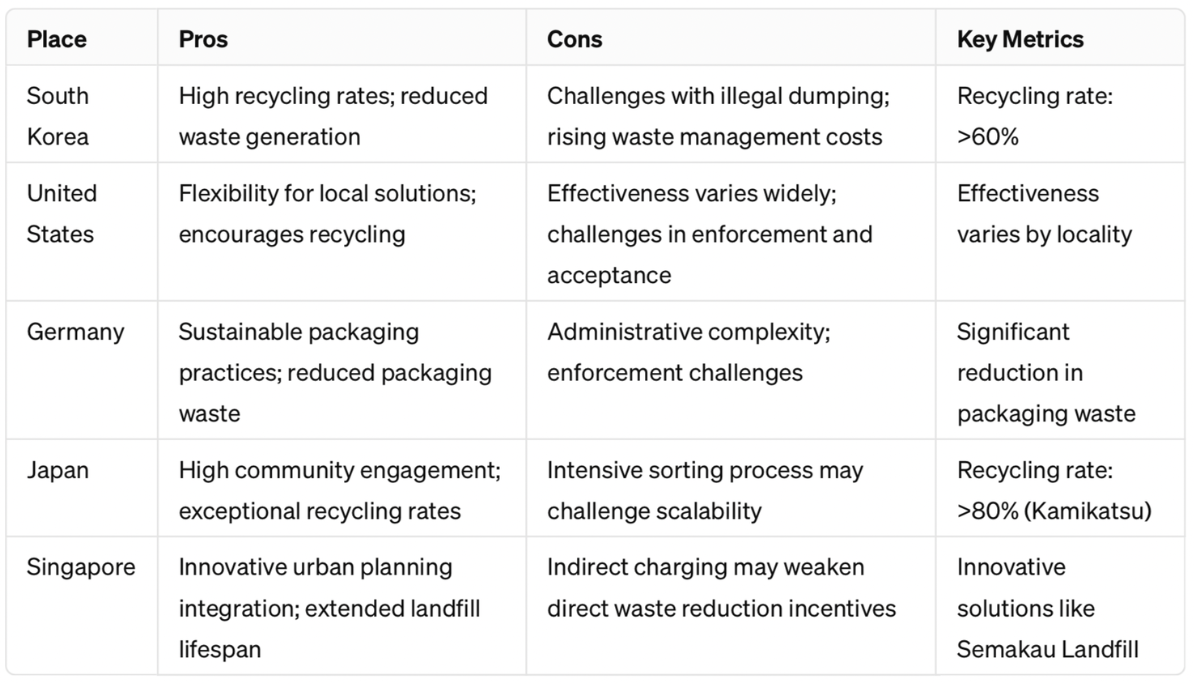Global Waste Charging Schemes:
Paving the Way for Future-Fit Cities and Businesses

As global waste management challenges escalate, innovative solutions are being sought to mitigate waste accumulation and its environmental impacts. Waste charging schemes, which incentivise waste reduction and recycling through financial mechanisms, have emerged as effective strategies in various places around the world. This article provides an overview of some of the most impactful waste charging schemes, highlighting their strategies, outcomes, and the insights they offer.
Showcases
South Korea: Volume-Based Waste Fee System (VBWFS)
South Korea's approach involves using prepaid garbage bags for non-recyclable waste disposal, with the cost based on the size of the bag. This system has led to significant reductions in waste generation and improvements in recycling rates.
United States: Pay-As-You-Throw (PAYT)
In the PAYT model, residents are charged based on the amount of trash they produce, promoting waste reduction and recycling. The effectiveness of PAYT programs varies significantly across different municipalities.
Germany: Green Dot System
The Green Dot system in Germany is a producer responsibility scheme where companies pay fees related to the packaging waste they produce. These fees are used to fund recycling and waste management, resulting in a substantial decrease in packaging waste.
Japan: "Gomi Zero" (Zero Waste) Movement
In places like Kamikatsu, Japan, residents participate in a rigorous waste sorting and recycling program aimed at achieving zero waste. This initiative has led to exceptionally high recycling rates.
Singapore: Waste Charging via Utility Bills
Singapore incorporates waste charging into utility bills, using water usage as a proxy for waste generation. This system, alongside innovative waste solutions like the Semakau Landfill, forms the core of Singapore's waste management strategy.
Pros and Cons

Exploring the Impacts
The exploration of these waste charging schemes reveals a mosaic of strategies, each tailored to the unique challenges and opportunities of their respective contexts.
Driving Behavioral Change
One of the most significant impacts of waste charging schemes is their ability to drive behavioral change among individuals and businesses. South Korea's VBWFS and the PAYT programs in the United States exemplify how financial incentives can motivate waste reduction at the source. In South Korea, the requirement to purchase designated bags for non-recyclable waste has made individuals and businesses more conscious of their waste generation, leading to a notable shift towards more sustainable consumption patterns. Similarly, PAYT programs have encouraged households in the United States to consider the financial implications of their waste, resulting in increased recycling and composting efforts.
Innovation in Packaging
Germany's Green Dot system highlights the potential of waste charging schemes to drive innovation in packaging. By placing the financial responsibility for packaging waste on producers, the scheme has incentivized companies to rethink their packaging designs, leading to the adoption of more sustainable practices. This shift not only reduces the environmental impact of packaging waste but also sets a precedent for the role of corporate responsibility in waste management.
Community Engagement and Participation
Japan's "Gomi Zero" movement, particularly in regions like Kamikatsu, showcases the power of community engagement and participation in achieving ambitious waste reduction goals. The high level of sorting required from residents has fostered a strong community ethos towards sustainability, underscoring the importance of involving communities in waste management strategies. This approach has not only achieved high recycling rates but also cultivated a culture of environmental stewardship.
Integrated Urban Planning
Singapore's innovative integration of waste charging within utility bills, coupled with its visionary urban planning, demonstrates the effectiveness of embedding waste management within broader urban infrastructure and policy frameworks. The creation of the Semakau Landfill, which doubles as a recreational area, exemplifies how waste management can be harmoniously integrated into urban development, providing valuable lessons in sustainability and land use planning.
Challenges and Adaptability
While the impacts of these waste charging schemes have been largely positive, challenges such as enforcement, public acceptance, and the sustainability of funding models persist. These challenges highlight the need for adaptability in policy design and implementation, ensuring that waste charging schemes can evolve in response to changing circumstances and continue to drive positive outcomes.
Lessons Learned
Analysing these diverse waste charging schemes reveals several key insights:
- Public Engagement and Education: The effectiveness of waste charging schemes is significantly influenced by public support, emphasising the need for comprehensive education and engagement efforts.
- Adaptability: Tailoring waste charging schemes to local conditions can enhance their effectiveness, as demonstrated by the varied success of PAYT programs in the United States.
- Holistic Approach: Effective waste management requires a broad strategy that includes not only waste charging but also recycling programs, waste reduction initiatives, and innovative waste processing solutions where applicable.
- Enforcement and Sustainability: Strong enforcement mechanisms are crucial for the success of waste charging schemes, as is the development of sustainable funding models to ensure the long-term viability of waste management systems.
These insights hopefully can guide cities and regions in designing and implementing waste charging schemes that address their unique waste management challenges and opportunities effectively.
THIS ARTICLE WAS CREATED BY
ESG Matters
Founded by one of the sustainability pioneers Dr Glenn Frommer, ESG Matters specialises in ESG data analytics, intelligent sensing technologies and sustainability advisory. Since 2014, ESG Matters has been a creator of digital platform solutions to meet the needs of sustainable impact investing and green financing. Working closely with listed companies, SMEs, and various growing organisations, ESG Matters aims to address the global market through providing business process outsourcing (BPO) services and solutions to achieve the relevant sustainable development goals (SDGs) and building resilience to climate change.
To learn more, visit http://www.esgmatters.asia
To learn more, visit http://www.esgmatters.asia

